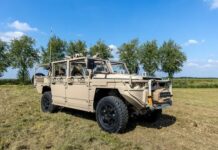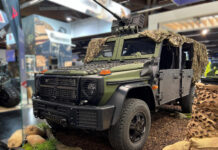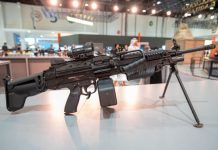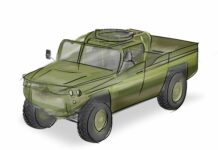As Soldat & Technik (S&T) already reported on 26 May 2023, the Dutch Ministry of Defence (MoD) has now officially confirmed that its air assault vehicle requirement will be fulfilled by the Caracal from Germany’s Rheinmetall.
On 15 June the Dutch Secretary of State for Armament, Christophe van der Maat, informed the Dutch Parliament that the Netherlands plans to procure 504 and Germany more than 1,000 of these vehicles from Rheinmetall.
With this so-called airborne platform, the Bundeswehr, in co-operation with the Dutch armed forces, plans to modernise the current vehicle fleet of the Division Schnell Kräfte as well as the 11th Luchtmobile Brigade. The plan is to standardise the vehicle fleets of the two countries’ airborne forces in the process.
“The new vehicles are technically identical for Germany and the Netherlands. They can be equipped with different weapons, for example a heavy machine gun and the SPIKE anti-tank system. They can also be equipped with ballistic protection, which can be attached to the vehicle in a modular fashion,” the Dutch MoD stated. The first vehicles should be ready for testing from 2024.
Rheinmetall, teaming up with ACS Armoured Car Systems and Mercedes-Benz to offer the Caracal, won the requirement against a bid from Krauss Maffei-Wegmann and Defenture, which had competed with the GRF platform. According to the Dutch announcement, factors regarding technical requirements, delivery time and price were decisive in the selection. “On this basis, Germany and the Netherlands jointly and unanimously decided in favour of the supplier Rheinmetall Land Systems (RLS),” reads the press release on the website of the Dutch MoD.
Accordingly, the 504 Dutch Caracals will cost EUR 302.5 M. Starting in 2025, 100 vehicles per year are to be delivered.
The budget proposal for the German part of the project is also still to be discussed. According to information available to S&T, this is to be discussed on 5 July. According to S&T’s current knowledge, however, neither the members of the German Budget Committee nor the Defence Committee have received the corresponding document. It is expected that the supply of vehicles for the German armed forces will amount to 200 units per year.
Caracal
A demonstrator of the Caracal vehicle, the series production of which is scheduled to begin before the end of 2023, was presented for the first time in mid-June 2022 at the Eurosatory defence exhibition in Paris.
Based on the new G-Class 464 series chassis, the Caracal airborne vehicle family is equipped with a six-cylinder 183 kW (249 hp) Euro 3 diesel engine, which can accelerate the vehicle up to 140 km/h and develops 600 Nm of torque. At 4.35 m long, 1.81 m wide and 1.85 m high, the vehicle is one of the most compact platforms in its class. With its 4×4 all-wheel drive, the Caracal has a high off-road capability that allows the vehicle to negotiate gradients of up to 60% and side slopes of up to 30%. It can climb obstacles of up to 33 cm and cross trenches up to 50 cm wide.

According to Rheinmetall the basic protection of the Caracal can be raised modularly to Level 1 according to STANAG 4569 (ballistic and mine protection). For this purpose modular protection elements are scaffolded in the doors and under the vehicle floor.
In the short-wheelbase variant (4.35 m long) on display in Paris, the Caracal is compact enough for two of the vehicles to fit inside a CH-53K King Stallion or CH-47F Chinook helicopter. According to a Rheinmetall representative, however, variants with a longer wheelbase are also planned, on the basis of which, for example, armament sets for material and personnel transport are to be realised. The version shown (an open 4-seater) has a gross vehicle weight of 4.9 tonnes (4.4 tonnes for air transport) and a payload of 1.5 tonnes. According to reports, the final logistics variant of the Caracal will be realised on a three-axle platform; 6×6 variants of the G-Class chassis (older series) have been procured in the past by the Swedish and Australian armed forces.
The division of tasks between the three companies envisages Mercedes-Benz manufacturing the chassis in Graz (Austria) and ACS contributing the chassis and superstructure from Augsburg. Rheinmetall is to assume the role of general contractor and deliver the vehicles in the required variants after final assembly. Rheinmetall will also develop the armament kits, qualify the vehicles and provide logistical support. The Düsseldorf-based defence contractor also offers full life-cycle support for more than 20 years.
Waldemar Geiger










